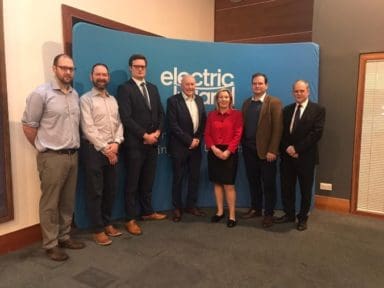
Add into the mix that 70% of bungalows, 50% of semis, 53% of detached and 44% of terraces are in SAP bands D – G the size and scale of the challenge of delivering an electric future becomes evident.
Between 2010 and 2020, renewable energy development in Northern Ireland (NI) has been largely steered by two targets:
- Achieving 40% electricity consumption from renewable generation by 2020
- Achieving 10% heat consumption from renewable generation by 2020
Both targets were part of the Strategic Energy Framework 2010 to 2020. The 40% target for renewable electricity was achieved ahead of schedule and has been surpassed but the renewable heat target was not achieved.
Looking ahead, the Climate Change (Northern Ireland) 2022 Act sets a target of an at least 100% reduction in net zero greenhouse gas (GHG) emissions by 2050. The Act also sets other sectoral targets including 2030 targets of at least 80% of electricity consumption from renewable sources.
All well and good, and with onshore wind delivering most of the renewable power, the 80% target may well be achievable. But, with wind operating at a c.32% load factor what do we do if the wind doesn’t blow? Back up will be required. If that’s not a fossil fuel, what is the alternative?
Removing the most carbon intensive sources of heating
The liquid fuel sector has always advocated that the overarching objective of any energy policy should be to ensure that the right system is put into the right home.
The key focus to 2030 should be ensuring that certain low-regret pathways remain open, while focusing on removing the most carbon intensive sources of heating. We believe we can do that without serious cost implications for liquid fuel users by replacing heating oil with renewable liquid fuels, such as HVO.
Although we have no Stormont Executive at the minute, work continues on the new energy strategy, and the Department for Economy (DfE) has taken the very positive step of establishing a biofuels stakeholder group.
The first meeting was held in August and an extract from the brief below shows the interest that DfE are taking in biofuels: “DfE is developing a call for evidence (CfE) on the roles that HVO and renewable biofuels (such as BioLPG) will play in decarbonising heat in Northern Ireland’s homes and buildings.
A comprehensive approach to the decarbonisation of heating
The outworking of the CfE will feed into a comprehensive approach to the decarbonisation of heating in homes and buildings in Northern Ireland, providing pathways that are stable, predictable, and constructive in reducing our emissions reductions targets, lowering energy demand, and helping to alleviate fuel poverty.
“As you will know, biofuels are typically regarded as much cleaner than their fossil equivalents and the role they play during our energy transition could be the vital accelerator we need to help Northern Ireland achieve its Net Zero by 2050 commitment. Properties that use kerosene or LPG could make an immediate transition to low carbon heating as biofuels are considered carbon neutral.”
The comment that biofuels are considered carbon neutral is a big statement and clearly shows the positive approach the Department is taking to decarbonisation.
A mix of solutions
OFTEC has always taken the position that a mix of solutions will be required to address decarbonisation and this message appears to be getting through to decision makers.
At a recent meeting and presentation to the Energy Institute, OFTEC’s David Blevings said: “We were delighted to be invited to the symposium, as liquid fuel has the majority share of the domestic heating market in Northern Ireland, and we need to be part of the discussion and solution.
“All the attendees welcomed our proposal to decarbonise oil fired homes with the introduction and move to biofuels. We have shown that HVO works and offers an immediate c.88% reduction in carbon emissions. A key take-away from the symposium was that everyone in the audience agreed there is no silver bullet to decarbonisation – all technologies will be required if we are to achieve the net zero targets. At OFTEC we are very optimistic that biofuels will be included in a new energy strategy for Northern Ireland.”
